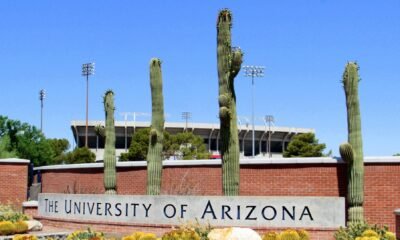Business
0th Circuit Overturns Nonprofit Denial for Grand Canyon University

In a significant legal decision, the Ninth Circuit Court on Friday vacated the U.S. Department of Education’s denial of nonprofit status to Grand Canyon University (GCU), a private Christian institution located in Flagstaff, Arizona. This ruling overturns a previous summary judgment that had supported the denial.
After deliberating for nearly a year, a three-judge panel concluded that the Department had incorrectly applied legal standards in its evaluation of GCU’s nonprofit status. At the time of the denial, the university was already recognized as a nonprofit by the Internal Revenue Service (IRS).
The panel highlighted that federal education officials mistakenly used IRS standards that are stricter than those defined in the Higher Education Act of 1965. U.S. Circuit Judge Daniel Collins noted in a 21-page opinion that the IRS’s Section 501(c)(3) mandates that institutions must be “organized and operated exclusively” for educational purposes. In contrast, the Higher Education Act requires only that an institution be “owned and operated by one or more nonprofit corporations or associations.” Consequently, the panel found that the Department relied on inappropriate legal benchmarks.
Since its establishment in 1949, GCU has primarily functioned as a nonprofit organization. The nonprofit classification is essential for universities, as it enables them to receive charitable contributions, attracts more financial aid, simplifies recruitment processes, and allows them to avoid property taxes—expenses that amount to about $9 million annually for GCU.
After facing financial issues, GCU’s board decided in 2000 to sell the university to Grand Canyon Education, a for-profit corporation. The university took a decade to stabilize before the board formed a new entity, “New GCU,” to reacquire the institution and restore its nonprofit status. However, the Department of Education refused to acknowledge the change, leading to a lawsuit by GCU in 2021. A federal judge dismissed their motion for summary judgment in 2022.
GCU spokesperson Bob Romantic expressed optimism regarding the recent ruling, describing it as a “long-awaited correction” of the Department’s unlawful standards. He voiced hopes for the swift recognition of GCU as a nonprofit institution.
New GCU, operating under a 2015 agreement, pays Grand Canyon Education a significant portion of its revenue for various support services. Brian Mueller, GCU’s president, also serves as CEO of Grand Canyon Education.
Although the IRS recognized GCU as a nonprofit in 2018, the Department of Education continued to challenge this status, asserting that the university operated to benefit Grand Canyon Education. GCU’s attorney, Steven Gombos, argued at a recent hearing that their service agreement aligns with industry standards, referencing similar arrangements at Purdue Global and Arizona State University.
Gombos emphasized that no evidence of private inurement—where insiders benefit personally from the organization’s net income—was found, suggesting that GCU meets the criteria for nonprofit designation. The Ninth Circuit’s ruling mandates that the Department of Education reassess GCU’s status using private inurement as the standard. Additionally, the court vacated the earlier summary judgment, halting further litigation as the Department reevaluates the case.
Despite requests for comment, the Department of Education has yet to respond. This ruling marks a second victory for GCU recently, following a partial dismissal of an FTC complaint that accused the university of misrepresenting itself in light of the Department’s denial of nonprofit status. The FTC has since updated its complaint.
Romantic reaffirmed GCU’s pride in its past as a for-profit institution, stating that nonprofit status is crucial for the university to pursue its objectives in research, grant writing, development, and active participation in NCAA activities.


















